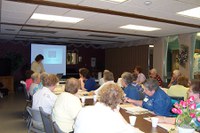Extension Program Helps Diabetics
(Click the image below to view a high-resolution image that can be downloaded)
Kathleen Hinschberger wasn't surprised when her doctor told her in 2005 that she has diabetes, not with a history of the disease on both sides of her family.
The Grand Forks woman set up an appointment with a diabetic educator and dietician to learn more about the disease and how she could control it. They gave her the help she needed. They also told her about the North Dakota State University Extension Service's program called Dining with Diabetes: North Dakota Style.
It stresses good nutrition and physical activity as ways to better manage diabetes.
""Dining with Diabetes gives people with diabetes the confidence that they can control their disease through a healthy diet and lifestyle choices,"" says NDSU Extension nutrition and health specialist Jane Edwards, who coordinates the program.
Another session will begin in mid-January in Lisbon. Anyone interested in participating in the program should contact Deb Lee, an Extension agent in Ransom County, at (701) 683-5823.
""I was very excited there was such as program,"" Hinschberger says.
She was one of 119 adults ranging in age from 20 to 85 who signed up for the pilot program in 2005-06, which was offered in Grand Forks, Foster, Richland, Cass and Walsh counties. Extension agents teamed up with local dieticians, nurses or certified diabetes educators to teach the course.
Participants attended four weekly 2 1/2-hour sessions and a follow-up class three months later. They learned about making good food choices, portion control, meal planning, healthy food preparation methods and how to read food nutrition labels. They taste tested recipes that are healthy versions of familiar foods. Plus, they learned about the importance of physical activity in controlling diabetes and some exercises they could use.
""Remembering relatives having diabetes with complications and what impact that had on me made me a little nervous about how to deal with my life change after being diagnosed,"" Hinschberger says. ""But the class has helped me so much, and it was wonderful to meet other people with diabetes and hear their input on issues."
Other participants found some of what they learned surprised them. For example:
- Balanced meals can be easy to fix and taste good, too.
- Diabetics need to look at the total amount of carbohydrate, not just the sugar content, on nutrition labels.
- Heart disease and diabetes go together.
- Some foods contain unexpectedly high amounts of fats and sugars.
The NDSU Extension Service adapted Dining with Diabetes from a successful program the West Virginia University Extension Service developed in 1998. The Dakota Medical Foundation gave NDSU a $10,000 grant for its pilot program and another $10,000 for this year's program. The Fargo-based foundation is a grant-making organization that invests in projects designed to improve health and health-care access. The North Dakota Department of Health also is contributing $2,000 to this year's educational efforts.
A program like this is important because the number of North Dakotans with diabetes has risen sharply, from 3.6 percent in 1994 to 6.7 percent in 2005, according to Edwards. More than 28,000 adults have the disease.
This year's program will be held in the same five counties and expand to the Turtle Mountain Indian Reservation and Ransom County. It also will have a slightly different format.
It will consist of four weekly sessions followed by two monthly sessions during a three-month period. Participants will take hemoglobin A1c tests before and after the program to see whether their blood sugar is under control. They'll also have blood pressure checks before and after the lesson series.
NDSU Agriculture Communication
| Source: | Jane Edwards, (701) 231-7478, jane.u.edwards@ndsu.edu |
|---|---|
| Editor: | Ellen Crawford, (701) 231-5391, ellen.crawford@ndsu.edu |


